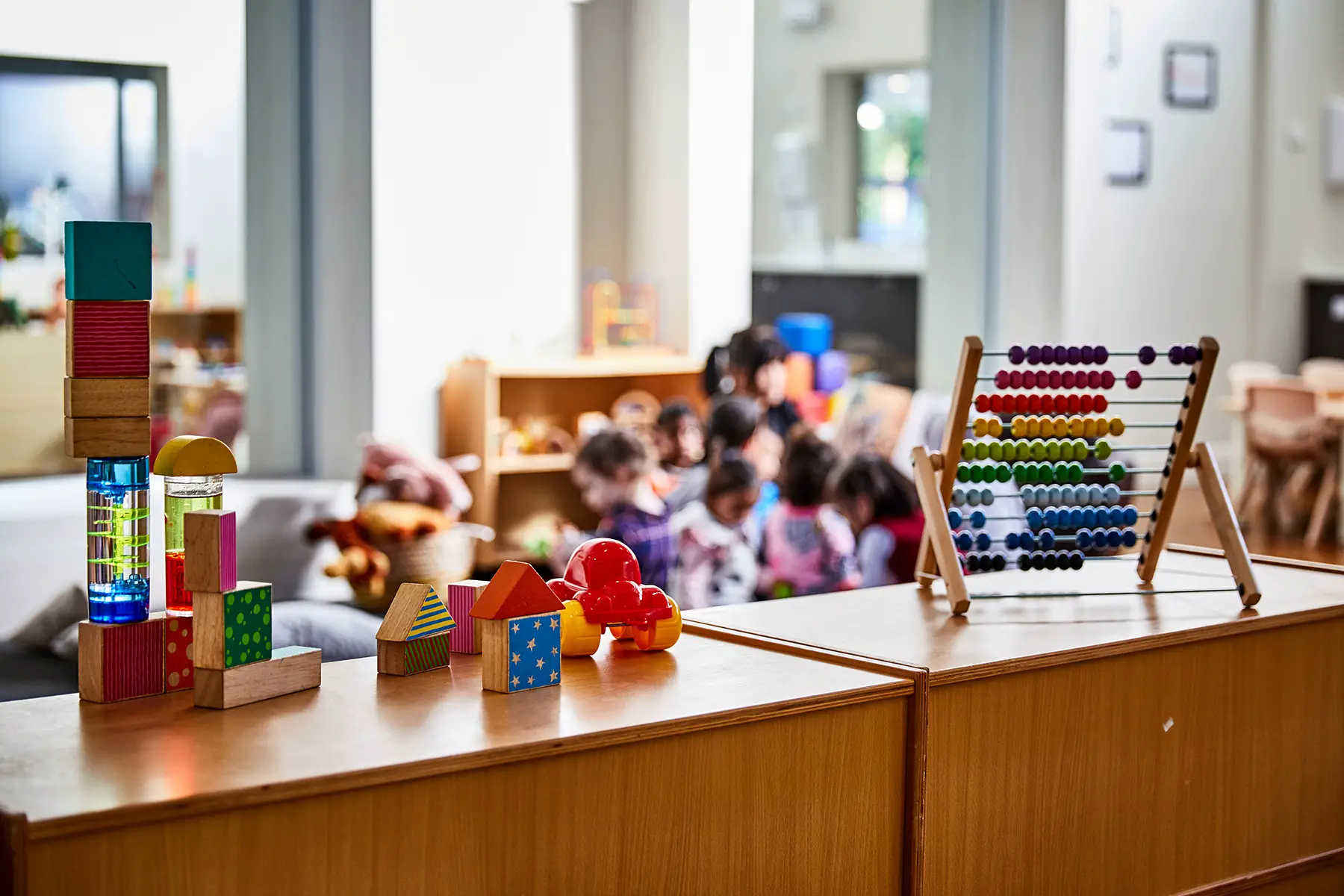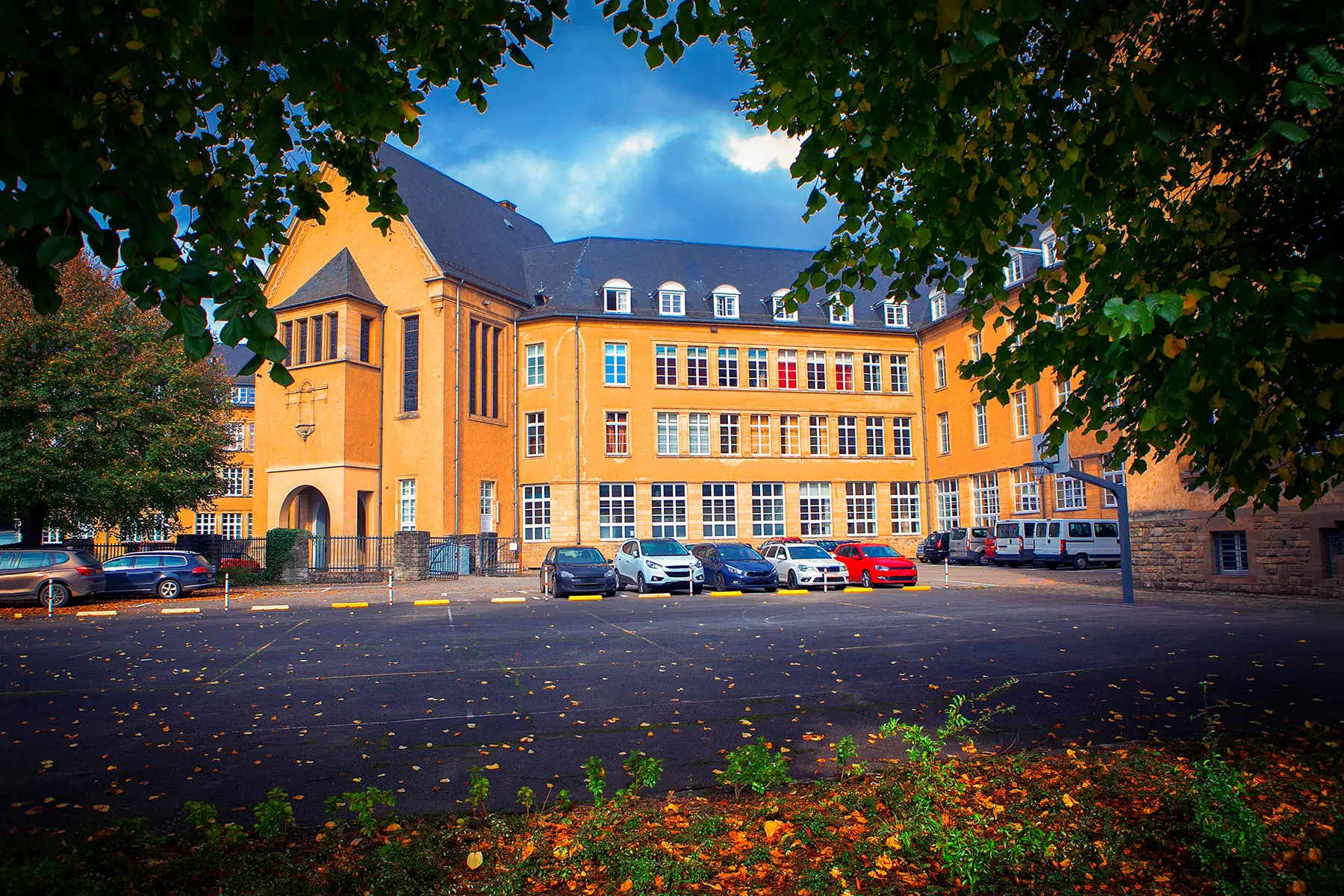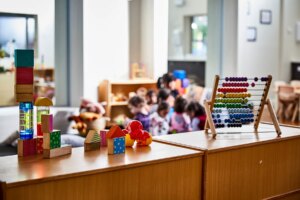Whether you’re just moving to Luxembourg or you’ve been here a while, sending your child to preschool is a big step for both of you.
Fortunately, there are plenty of preschool options and great support for young children in Luxembourg. Get to know the country’s systems for daycare and preschool in the following sections:
How does early years education work in Luxembourg?
Before starting primary school at age 6, children in Luxembourg attend early education and preschool. This takes the following structure:
- Ages 0–4: children can attend non-compulsory crèche, mini-crèche or childcare.
- Age 3: Cycle 1 pre-primary education begins – this is not compulsory, but children are expected to attend if they have registered.
- Age 4–5: Children begin compulsory preschool (Spillschoul) at an elementary school.
This article focuses on Cycle 1 education from ages 3–5.
If you are looking for childcare options, these include the following:
- Crèches (public, private, and mini) – childcare centers for children from three months to four years old. They often have a range of hours to suit your needs and are mostly run in Luxembourgish.
- Multilingual private crèches – privately owned crèches run in languages other than Luxembourgish
- Day nurseries – daycare centers for children up to eight years old, with a maximum use time of 16 hours per week
- Parental assistants, nannies, and au pairs – individual care in your own home where you are the employer
- Maisons relais – supervision for children of all ages outside of school hours, providing meals, activities, and homework help
What do children do at preschool in Luxembourg?
Preschool is mainly about the child’s social and cognitive development. All children are taught in Luxembourgish regardless of their mother tongue and may be introduced to spoken French.
To prepare for Cycle 2, there is a focus on each child’s individual needs. This ensures they are equipped with the necessary reading, writing, and social skills for the next stage.
Preschools usually follow a shorter timetable than primary schools. For example, this might consist of three full days a week (08:00–11:50 and 14:00–15:50) and two half-days (08:00–11:50). On the shorter days, lunch may not be provided.
How to find and choose a preschool
Children from age three have the right to a place at a public school. In Luxembourg, the general rule is to attend the designated public school in the educational district where you live.
After registering with your commune of residence, you should receive a letter by 15 April of the year that your child is due to start compulsory education (when your child is age four by 1 September). This automatically registers your child with the local preschool after you have completed the form attached to the letter.

It is possible to have your child attend school in another area, but you will have to make a special request to the college of aldermen before 1 May of the year prior to the start of the intended school year.
Because of these restrictions, it may be a good idea to consider schools when moving to Luxembourg and choosing a place to live.
How to enroll for preschool in Luxembourg
For early education and preschool, you should fill out the form attached to the letter you received. Submit it with your family record book and your child’s birth certificate to your commune’s administration department or directly to the school in question.
Once all places have been assigned, you will receive an acceptance letter outlining important information like start dates. In certain cases, you can defer your child’s attendance by one year due to physical or mental health concerns.
However, if you move to Luxembourg after 15 April or part-way through the school year, you will need to register your child with the education department or the secretariat of your new commune. This process requires you to present a valid ID, a family record book or marriage certificate, the child’s birth certificate, a registration certificate, and, in some cases, a residence permit.
All children who have just arrived in Luxembourg must take supplementary language classes if their skills do not match those of their new classmates. At the preschool level, this is just an introduction to Luxembourgish, taken once or more per week. The number of classes decreases with progress.
Costs of preschool in Luxembourg
One of the main appeals of sending your child to a public preschool in Luxembourg is that they are free of charge. This comes as part of the government’s continued push for equal and inclusive education opportunities and is accompanied by free access to school meals and certain childcare facilities during school weeks.
Financial Aid for Preschool in Luxembourg
As a parent in Luxembourg, you can enroll in the childcare service voucher scheme (Chèque-Service Accueil). The scheme entitles you to financial aid for childcare services and non-formal education. This is based on various factors, including household income, but could help cover the costs of your daycare.
International preschools in Luxembourg
In addition to Luxembourg’s international schools, pre-primary options are available. Most of these are attached to an international primary and secondary school. One of the main advantages of these schools is that your child can learn in their native language – Luxembourg has preschools that teach in English, French, German, and Italian.
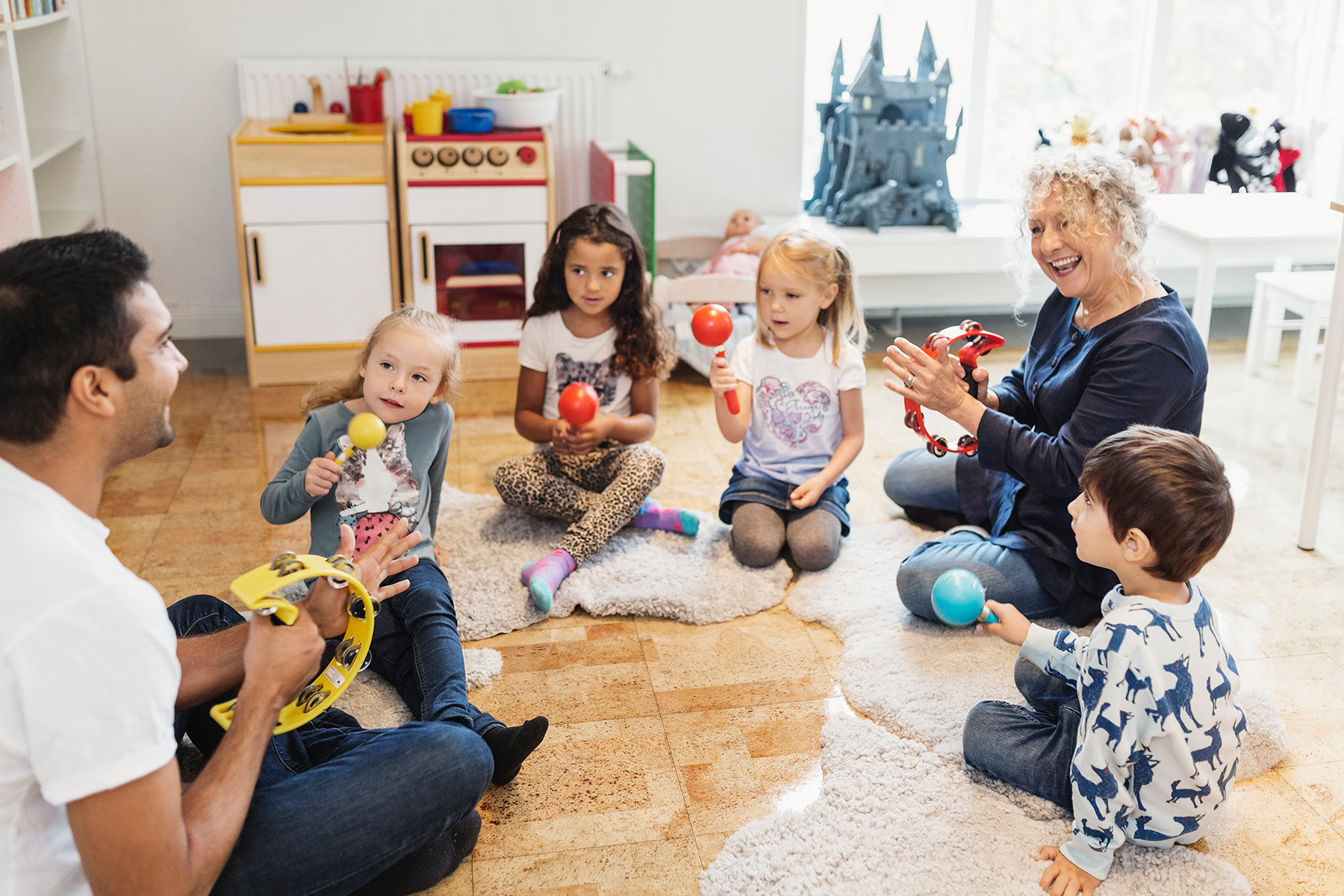
As these are private organizations, they do not have limitations when setting fees.
There are six free-of-charge European Schools in Luxembourg and counting, but classes start from age six. This is an option to consider as your child gets older.
What do children do at international preschools?
As private institutions follow curricula from different countries, international preschools in Luxembourg vary in their activities and schedules. However, most begin around 08:00 and end between 14:00 and 16:00.
Most international preschools aim to encourage social development, curiosity, creativity, and basic literacy and mathematics. Some schools also offer a bilingual environment for linguistic growth from a young age. It is worth noting that nap time is not usually allotted, and basic bathroom skills are expected by this age and will not be taught at most international preschools.
Finding and choosing an international preschool
Not all international schools in Luxembourg offer preschool classes, so that is one of the first things to check when deciding on a school. Then, it is a good idea to narrow things down by distance from your home, language of instruction, and the school’s curriculum and values.
It is important to visit the preschools in person to get a sense of the facilities and overall atmosphere.
How to enroll in an international preschool
Due to the independent nature of international schools, enrolment processes vary by school. Some may require interviews or language assessments in advance, and others may not. However, most will require the child’s necessary documentation and disclosure of any additional educational needs.
It’s important to find out the necessary steps and procedures as early as possible to allow time for preparation if needed. It is also worth noting that international schools can reject a student for any reason, so leaving ample time to apply to other schools is also a good idea.
Costs of international preschools in Luxembourg
International schools can set their own prices, which usually range from €10,000 to €20,000 per year. A few state-run international schools are cheaper but less likely to provide preschool classes.
Most international schools do not require you to pay the full year’s fees if your child joins part-way through an academic year. However, it is worth noting that tuition fees increase as your child progresses through the school years.
Montessori preschools and daycare in Luxembourg
Montessori is an alternative method of education that is student-led and self-paced. It focuses on creativity, independence, and natural curiosity rather than formal teaching methods.
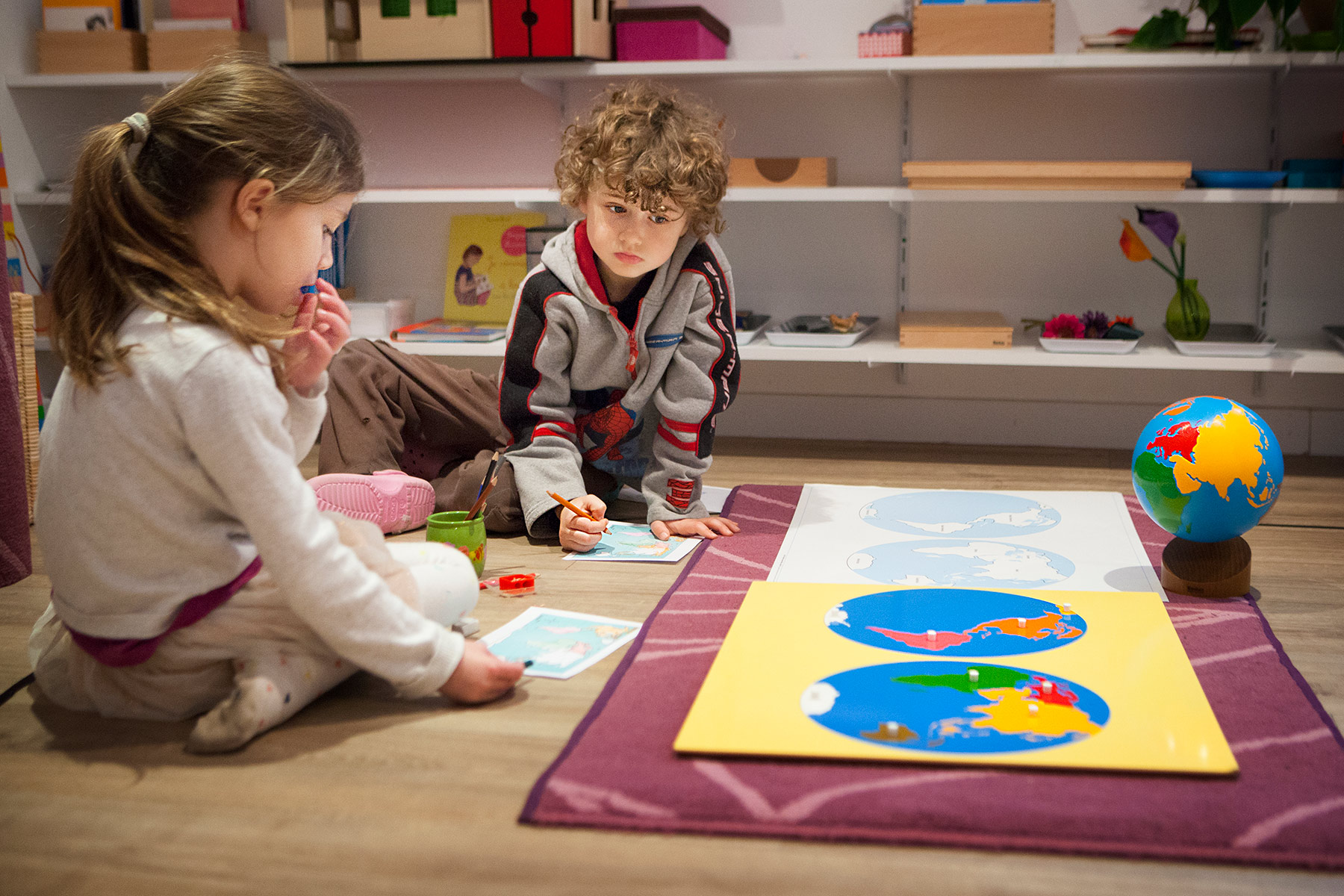
In Luxembourg, there are a few Montessori crèches, daycare centers, and schools. Most focus on ages up to four, but some of the schools offer classes up to the age of 12.
Advantages of Montessori preschools and daycare
Many Montessori facilities provide daycare and after-school clubs. They can either be supplementary to your child’s formal education or form a stepping stone before they start.
One of Montessori’s advantages is that typically, the children are not separated from other age groups, though they may be encouraged to work in teams of similar ages or skills. By being in the same room as the older children, they can easily learn from them.
Many of the activities at Montessori have a focus on motor skills and teamwork. These activities are good preparation for their time at formal school. There are also often both indoor and outdoor areas to encourage creativity and different types of play and teamwork.
As an internationally recognized form of education, many Montessori facilities will have a multicultural and multilingual environment to welcome your child. However, as they are privately owned, prices and schedules can vary widely.
General tips for preschool in Luxembourg
Regardless of what style of preschool or daycare you choose for your child in Luxembourg, it’s important to make sure both you and your little one are prepared for their first day. The tips below should help you both feel ready:
- Try introducing your child to other children and social activities through daycare or shorter sessions before entering formal schooling to help them acclimatize, particularly if they are naturally anxious.
- Ask the facility’s staff about the activities and whether anything needs to be packed, such as waterproof clothes or a change of clothes for accidents and muddy mischief. Make sure to label their belongings and provide emergency contact information, too.
- Little details like allowing enough time to arrive for pick up and drop off will help you and your child feel more at ease about their first steps into independence.
- If you are in need of any translation or cultural help, you can make free use of an intercultural mediator to make the transition as smooth as possible.
Useful resources
- European Commission – information about the education system, daycare, and family benefits in Luxembourg
- Luxembourg.lu – official portal of the Grand Duchy of Luxembourg
- Guichet.lu – information portal about official procedures and services
- Ville de Luxembourg – useful resources about family life in the City of Luxembourg
- Ministry of National Education (MEN) – information on Luxembourg’s educational system with multilingual services for foreign families


